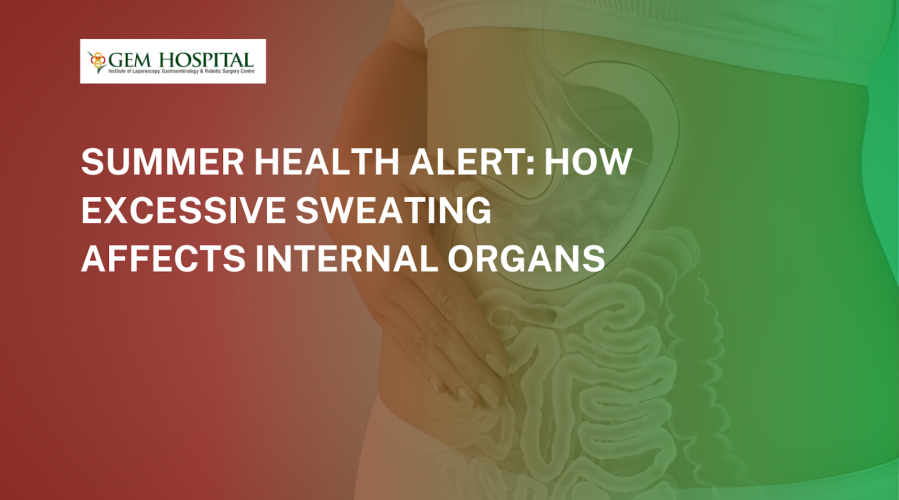Consult experienced hernia doctors in Chennai for expert surgical care. Advanced diagnosis, safe hernia surgery, and faster recovery with specialized treatment.
Summer Health Alert: How Excessive Sweating Affects Internal Organs

The summertime high temperatures lead to more sweating, which is a way the body cools itself. Beyond being necessary to cool the body down, sweating too much increases risk for serious harm to your internal organs. Being aware of the health risks of excessive sweating in the summer can help you to take action to prevent it and damage vital organs.
How Excessive Sweating Affects Internal Organs: Key Health Risks
- Dehydration and Kidney Stress:
Sweating excessively can lead to a significant loss of bodily fluid, and an increased risk for dehydration. When dehydration occurs, that added strain is placed on your kidneys as they continuously work without sufficient fluid to regulate rate. Continued dehydration may negatively affect kidney function and increase risk for kidney stones.
- Electrolyte Imbalance:
When you excessively sweat the body will lose valuable electrolytes that are important to ensure a stable balance of sodium, potassium, and magnesium. Losing these electrolytes lead to muscle cramps and irregular heartbeats called arrhythmias. If the irregular heartbeats are significant, it can affect the heart health.
- Cardiovascular Strain:
When the body sweats significantly and loses fluid of course the body continues to pump and do what it has been designed to do. However, if the body is losing it's fluid levels in sweat then the heart again must begin to work harder to circulate blood. Increased workload on the heart can lead to developing potential cardiovascular issues. If a person has any sort of heart issue previously this increase in workload will be greater than substantial.
- Liver Function Impairment:
Sweating decreases blood volume, therefore consequent to that nutrients and oxygen are being delivered less effectively to your organs like your liver, therefore affecting your livers' detoxification process and poising the threat that toxin build up may develop.
- Digestive Issues:
Extreme sweating can also inhibit digestion. When your body directs it's efforts to cool down, blood flow is redirected away from the digestive system, turning simple digestion into indigestion and stomach distress.
Addressing Summer Sweating Health Risks
Managing excessive sweating is crucial to avoid complications. Staying hydrated, consuming electrolyte-rich drinks, and wearing breathable clothing can mitigate these summer sweating health risks. Additionally, monitoring urine color and frequency can provide early warning signs of dehydration or kidney stress.
Excessive sweating is a primary concern but needs to be controlled to mitigate any complications, drinking plenty of water, drinking electrolyte beverages, wearing breathable clothing and keeping hydrated is key. You can also be vigilant for early signs of dehydration or internal stress by monitoring your urine color and frequency.
Excessive sweating in summer is a health risk, here is that excessive sweating risks you are talking about is much more than discomfort-- please see our video again that demonstrates the risk to internal organs including the heart, kidneys and liver. With vigilance, and proactive actions to avoid excessive sweating, many of the risks from summer sweating may be mitigated. Should you experience any concerning symptoms, including dizziness, muscle cramps/stiff joints or stomach problems, be sure to contact a medical professional.
Book your appointment at GEM Hospital today for expert support for a safe and effective summer!
Blogs & Article
Get advanced liver transplant treatment in Chennai with expert surgeons, modern technology, and comprehensive care for safe and successful outcomes.
Get advanced piles treatment in Erode with expert doctors. Safe procedures, modern technology, and effective care for fast relief and recovery.


